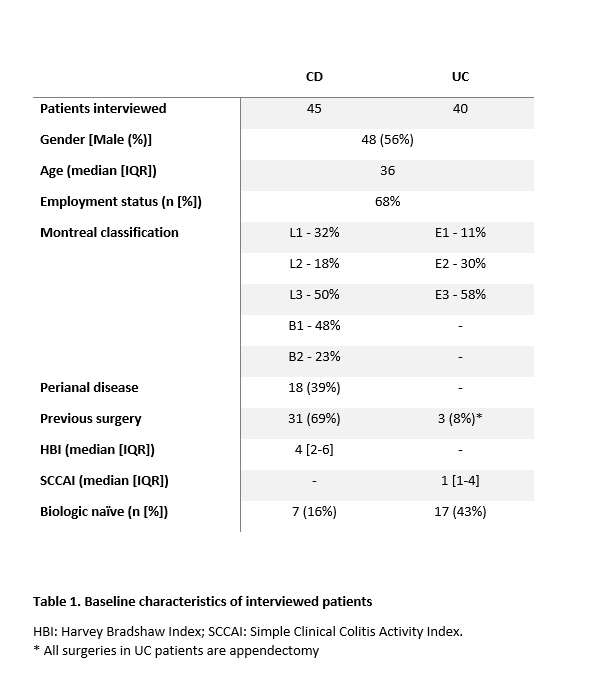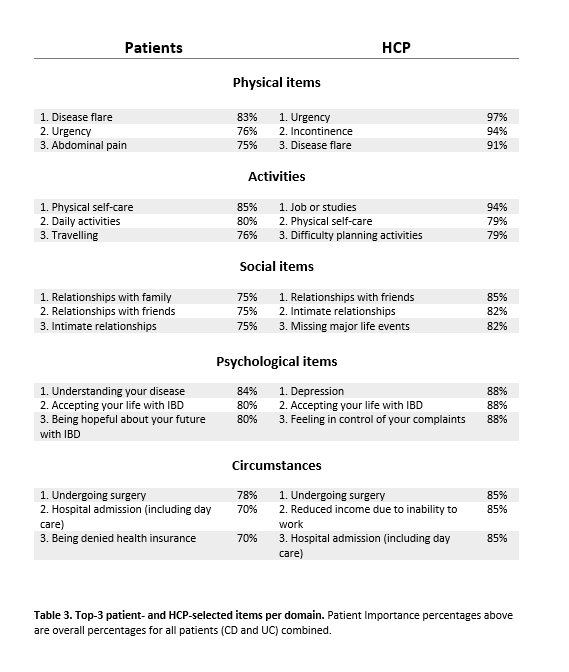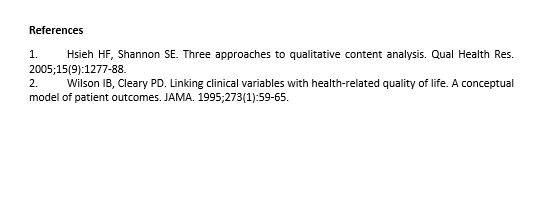P185 Global perception of normal life by healthcare professionals and IBD patients: mind the gap
Van Oostrom, J.(1)*;Anjie, S.(1);Braad, M.(1);Horrigan, J.(2);Karimi, N.(3);Adi, B.(4);Ganesh, G.(4);Yang, S.K.(5);Lasa, J.(6);Broër, C.(7);de Kruif, A.(8);Olivera Sendra, P.(9);Ye, B.D.(10);Banerjee, R.(4);Connor, S.(11);Siegel, C.(12);Peyrin-Biroulet, L.(13);Gecse, K.(14);D'Haens, G.(1);
(1)Amsterdam UMC, Gastroenterology and Hepatology, Amsterdam, The Netherlands;(2)Dartmouth Hitchcock Medical Center- Lebanon- New Hampshire- United States of America, Gastroenterology and Hepatology, Lebanon, United States;(3)South West Sydney Clinical Campuses- UNSW Medicine and Health- UNSW Sydney Medicine and Health, South Western Sydney IBD Research Group- Ingham Institute for Applied Medical Research, Sydney, Australia;(4)Asian institute of Gastroenterology, Gastroenterology and Hepatology, Hyderabad, India;(5)Asan Medical Center- University of Ulsan College of Medicine, department of gastroenterology, Seoul, Korea- Republic Of;(6)Centro de Educación Médica e Investigación Clínica CEMIC, IBD Unit- Gastroenterology Section- Department of Internal Medicine, Buenos Aires, Brazil;(7)University of Amsterdam, Faculty of Sociology, Amsterdam, The Netherlands;(8)Free University, Faculty of Science- Methodology and Applied Biostatistics, Amsterdam, The Netherlands;(9)Lunenfeld-Tanenbaum Research Institute- Sinai Health System, Zane Cohen Centre for Digestive Diseases, Toronto, Canada;(10)Asan Medical Center- University of Ulsan College of Medicine, Gastroenterology and Hepatology, Seoul, Korea- Republic Of;(11)Liverpool Hospital, Department of Gastroenterology, Sydney, Australia;(12)Dartmouth Hitchcock Medical Center, Department of Gastroenterology, Lebanon, United States;(13)University of Lorraine- CHRU-Nancy, Department of Gastroenterology, Nancy, France;(14)Amsterdam UMC, Department of Gastroenterology and Hepatology, Amsterdam, The Netherlands;
Background
For patients living with inflammatory bowel diseases (IBD), the ultimate treatment goal is “normal life”. However, no patient-reported outcome measurement (PROM) exists to measure the level of life normality in IBD. We previously asked patients across the world (5 continents) to identify and rank-order items important to their “normal life”. The top-25 ranked items are being used for subsequent PROM development. In this study, we aimed to compare the perception of healthcare professionals (HCP) and patients with IBD on normal life.
Methods
IBD patients without an ostomy, pouch or significant comorbidities were interviewed in their mother tongue in 5 continents about “normal life” using a semi-structured interview guide. All items indicated as important were extracted from translated transcripts using directed content analysis (1) until saturation of items occurred. Categorisation was guided by the Wilson’s & Cleary’s Quality of Life model. (2) Second, in an online Delphi procedure, interviewed patients and HCP from each participating centre scored importance of each item on a 0-10 scale. Items scored 7 or higher by >75% were considered important to the respective group. Patient-ranked items were then presented to a patient focus group to clarify wording and merge similar items. Items merged in the patient focus group were merged similarly in HCP rankings. Third, HCP- and patient-rankings were compared. We compared top-25 items selected for PROM development and top-3 items per category.
Results
45 CD and 40 UC patients spread over 6 countries were interviewed (median age 36, 56% male, 68% employed, median disease duration 7 years [IQR 4-15]) (table 1). Saturation occurred after 33 CD and 36 UC interviews, yielding 156 unique items. In the Delphi procedure, 54 patients considered 31 items important for normal life with IBD of which 25 remained after focus group discussion. 34 HCP (12 IBD nurses, 16 IBD gastroenterologists, 6 colorectal surgeons) considered 72 items important.
Top-25 rankings overlapped in 15 items between patients and HCP, being 5 of 12 physical, 1 of 4 activities, 2 of 3 social, 4 of 11 psychological items and 3 of 5 circumstances (table 2). Top-3 rankings per category overlapped in 2 physical, 1 activities, 2 social, 1 psychological items and 2 circumstances (table 3).
Conclusion
We identified discrepancies in the perception of normal life with IBD between patients living with IBD and healthcare professionals (HCP). Of top-25 selected items for PROM development, 15 items overlapped between patients and HCP. Of top-3 items per category, the least overlap was seen in activities and psychological items. PROM development and international validation is ongoing.






